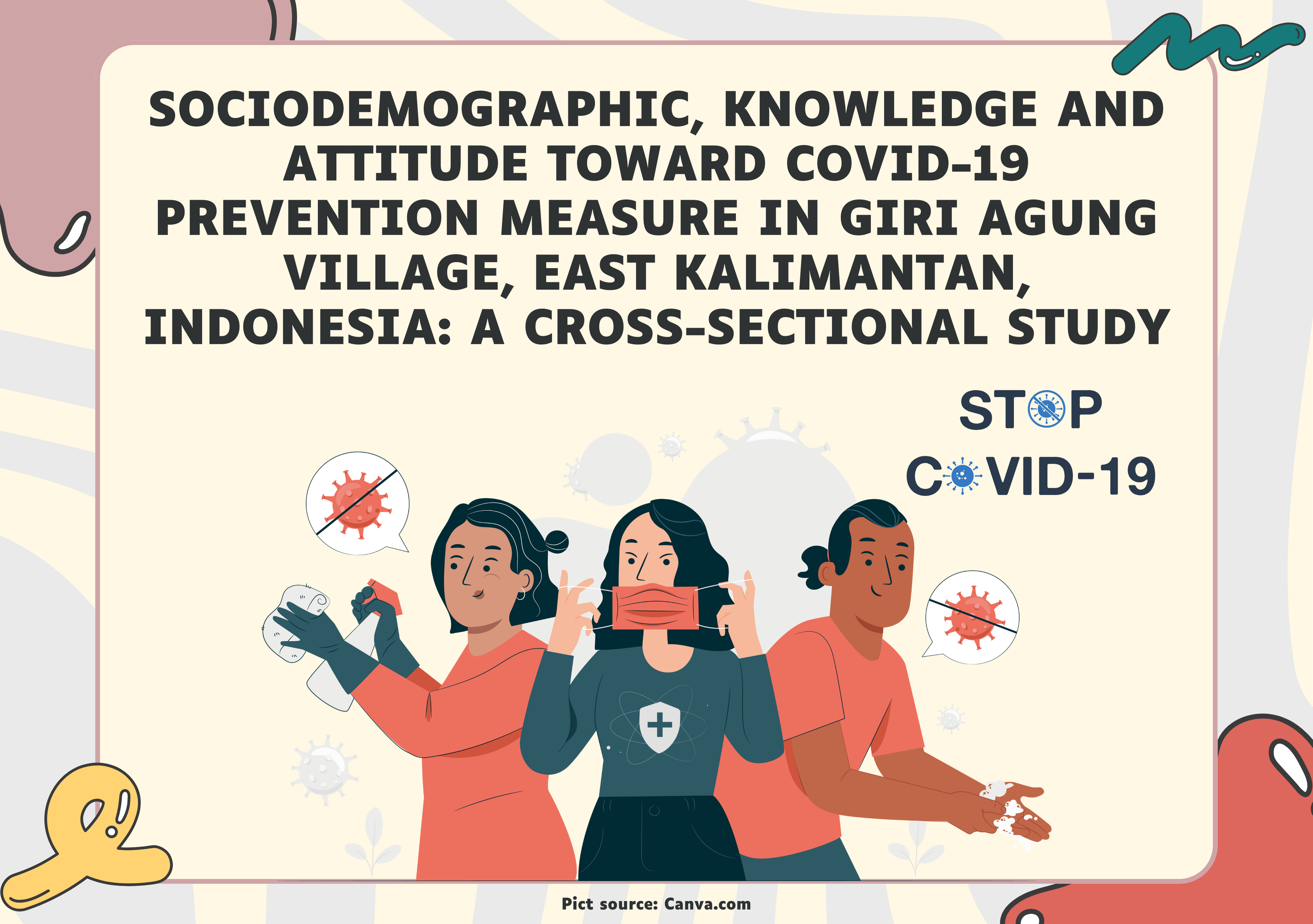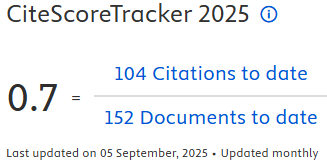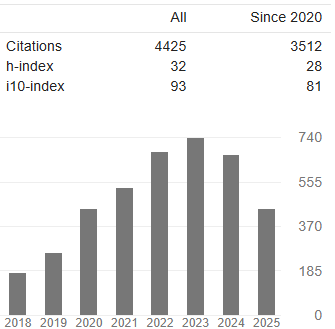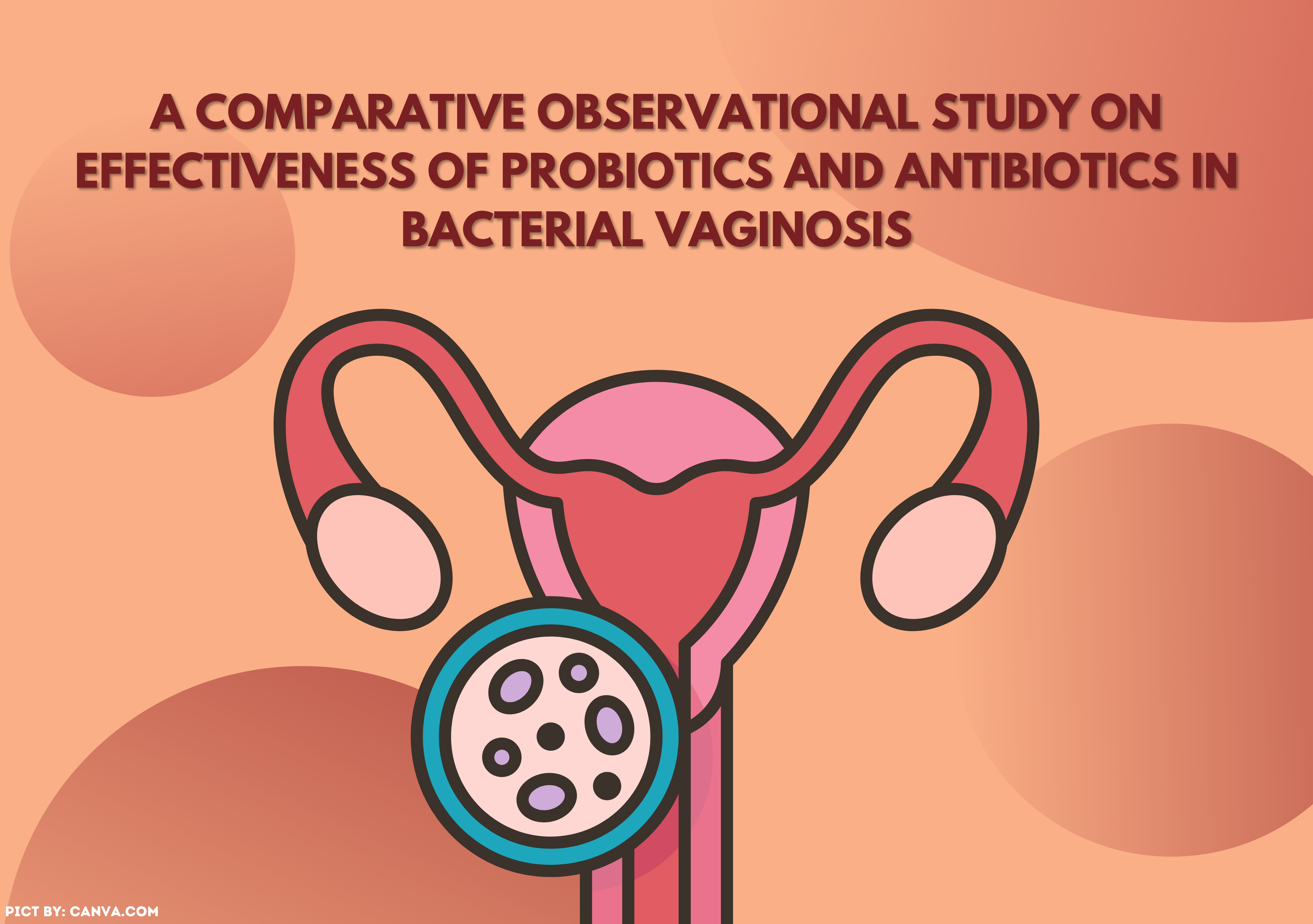SOCIODEMOGRAPHIC, KNOWLEDGE AND ATTITUDE TOWARD COVID-19 PREVENTION MEASURE IN GIRI AGUNG VILLAGE, EAST KALIMANTAN, INDONESIA: A CROSS-SECTIONAL STUDY

Introduction: In mid-2022, a Central Statistics Agency (BPS) survey reported that Indonesian people's compliance with COVID-19 prevention measures ranged between 70-84%. Many studies have also measured preventive behavior in urban areas but are still limited to rural areas. The information exposure of rural communities can be much different from that of urban communities, facilitated by technological developments. Aims: This research looked at COVID-19 prevention behavior in rural settings, which is essential to support targeted prevention programs. Methods: This study employed a quantitative study design with an analytical observational design through a cross-sectional approach. Residents aged 17 to 55 were recruited in Giri Agung Village, Sebulu, Kutai Kartanegara, East Kalimantan. Chi-square and Binary Logistic Regression were used to analyze the data. Result: This research found a significant association between gender (p-value=0.002), education (p-value=0.003), knowledge (p-value=0.008), and attitudes (p-value=0.001) toward COVID-19 prevention measures. We discovered that education level most influenced prevention measures in binary logistic regression. Conclusions: Knowledge is one of the most critical factors in realizing action because it can build trust to perceive reality, make decisions, and determine actions to be taken on an object
Adiputra, I.M.S.A., Siregar, D., Anggraini, D.D., Irfandi, A., Trisnadewei, N.W., Sari, M.H.N., Oktaviani, N.P.W., Laksmini, P., Supinganto, A., Pakpahan, M., Listyawardhani, Y., Islam, F., and Ani, M. (2021) Statistik Kesehatan: Teori dan Aplikasi. Medan: Yayasan Kita Menulis.
Bukata, I.T. et al. (2022) Knowledge, Attitudes, and Practice Toward Prevention of COVID-19 Among Jimma Town Residents: A Community-Based Cross-Sectional Study. Frontiers in Public Health, 10(April), pp. 1–10. https://doi.org/10.3389/fpubh.2022.822116
Chandra, B. et al. (2019) Influence of Predisposing, Enabling, and Reinforcing Factors on the Election of Seeking of Birth Attendant in Health Care Community of Kota Padang in 2018. In ICHP The First International Conference on Health Profession, pp. 222–231. https://doi.org/10.18502/kls.v4i15.5763
Chen, X. and Chen, H.H. (2020) Differences in preventive behaviors of covid-19 between urban and rural residents: Lessons learned from a cross-sectional study in china. International Journal of Environmental Research and Public Health, 17(12), pp. 1–14. https://doi.org/10.3390/ijerph17124437
Dharmaputra Pandelaki, Y. et al. (2022) Hubungan Antara Pengetahuan Dan Sikap Dengan Tindakan Pencegahan COVID-19 Pada Pengemudi Taksi Online Di Kota Tomohon, Jurnal KESMAS.
Dinkes Kukar (2021) Laporan Harian Covid-19 Kukar.
Fauziah, N.A., Yuliasari, R. and Febriyanti, H. (2021) Hubungan Pengetahuan dan Sikap Ibu Hamil dengan Perilaku Pencegahan COVID–19 dalam Adaptasi Kebiasaan Baru. Journal of Research in Social Science and Humanities, 1(1), pp. 9–15.
https://doi.org/10.47679/jrssh.v1i1.6
Gannika, L. and Sembiring, E. (2020) Tingkat Pengetahuan dan Perilaku Pencegahan Coronavirus Disease 2019 (COVID-19) Pada Masyarakat Sulawesi Utara. NERS: Jurnal Keperawatan, 16(2). https://doi.org/10.25077/njk.16.2.83-89.2020
Gomes da Silva, J. et al. (2021) Education as a Predictor Factor for Knowledge of COVID-19 in Portugal. Frontiers in Public Health, 9(September), pp. 1–8. https://doi.org/10.3389/fpubh.2021.680726
Indonesia COVID-19 Task Force (2022) COVID-19 Distribution. (Accessed: 14 January 2022).
Indonesia Statistical Bureau (2010) Peraturan Kepala Badan Pusat Statistik Nomor 37 Tahun 2010: Klasifikasi Perkotaan dan Perdesaan di Indonesia. 2nd edn. Jakarta: Indonesia Statistical Bureau.
Institute of Medicine (US) Committee (2006) The Impact of Social and Cultural Environment on Health. Washington: National Academies Press (US).
Irmawartini and Nurhaedah (2017) Metodologi Penelitian. Jakarta: Pusat Pendidikan Sumber Daya Manusia Kesehatan.
Katoa, K. et al. (2016) Positive Attitude Towards Life, Emotional Expression, self-rated health, and depressive symptoms among centenarians and near- centenarians. Physiology & Behavior, 20(9), pp. 930–939. https://doi.org/10.1080/13607863.2015.1056770
Khairunnisa, Z., Sofia, R. and Magfirah, S. (2021) Hubungan Karakteristik Dan Tingkat Pengetahuan Dengan Perilaku Pencegahan Covid-19Pada Masyarakat Desa Paya Bujok Blang Pase Kota Langsa. Jurnal Averrous, 6(1), p. 53. https://doi.org/10.29103/averrous.v7i1.4395
Lee, M., Kang, B.A. and You, M. (2021) Knowledge, attitudes, and practices (KAP) toward COVID-19: a cross-sectional study in South Korea. BMC Public Health, 21(1). https://doi.org/10.1186/s12889-021-10285-y
Lee, Y.C. and Wu, W.L. (2014) The effects of situated learning and health knowledge involvement on health communications. Reproductive Health, 11(1). https://doi.org/10.1186/1742-4755-11-93
Li, Q. et al. (2020) Early Transmission Dynamics in Wuhan, China, of Novel Coronavirus–Infected Pneumonia. New England Journal of Medicine, 382(13), pp. 1199–1207. https://doi.org/10.1056/NEJMoa2001316
Lin, L. et al. (2014) Media Use and Communication Inequalities in a Public Health Emergency: A Case Study of 2009–2010 Pandemic Influenza a Virus Subtype H1N1. Public Health Reports, 129(6_suppl4), pp. 49–60. https://doi.org/10.1177/00333549141296S408
Liu, L. et al. (2016) Use of a knowledge-attitude-behaviour education programme for Chinese adults undergoing maintenance haemodialysis: Randomized controlled trial. The Journal of International Medical Research, 44(3), p. 557. https://doi.org/10.1177/0300060515604980
Lubis, D.A.S. (2021) Hubungan Tingkat Pengetahuan dengan Sikap dan Perilaku terhadap Pencegahan Infeksi Covid-19 Pada Mahasiswa Semester 6 Fakultas Kedokteran USU. (Accessed: 24 January 2024).
Mayasari, O.P., Ikalius and Aurora, W.I.D. (2021) Faktor-Faktor Yang Berhubungan Dengan Perilaku Masyarakat Dalam Pencegahan Covid-19 Di Wilayah Kerja Puskesmas Kenali Besar Kecamatan Alam Barajo. Medical Dedication (medic) : Jurnal Pengabdian kepada Masyarakat FKIK UNJA, 4(1). https://doi.org/10.22437/medicaldedication.v4i1.13467
Ministry of Internal Affairs of Indonesia (2022) Kemendagri Mutakhirkan Kode, Data Wilayah Administrasi Pemerintahan dan Pulau di Seluruh Indonesia (The Ministry of Home Affairs Updates Codes, Data on Government Administration Areas and Islands throughout Indonesia).(Accessed: 8 January 2023).
Notoatmodjo, S. (2014) Ilmu Perilaku Kesehatan, Ilmu Prilaku Kesehatan. Jakarta: Rineka Cipta.
Notoatmodjo, Soekidjo (2014) Promosi Kesehatan dan Perilaku Kesehatan. Jakarta : PT. Rineka Cipta.
Pangkey, M.R.A. et al. (2022) Hubungan Antara Umur Dan Tingkat Pendidikan Dengan Perilaku Pencegahan Coronavirus Disease 2019 (Covid-19) Pada Masyarakat Kelurahan Talete 1 Kota Tomohon. Jurnal KESMAS.
Riana Sari, A. et al. (2020) Perilaku Pencegahan COVID-19 Ditinjau dari Karakteristik Individu dan Sikap Masyarakat. JPPKMI, 1(1), pp. 32-37. https://doi.org/10.15294/jppkmi.v1i1.41428
Purnama, J.S. and Sofiana, L. (2023) Association between close contact history and the risk of COVID-19 in Purwakarta District, Indonesia. Epidemiology and Society Health Review (ESHR), 5(1), pp. 32–40. https://doi.org/10.26555/eshr.v5i1.6216
Ray, V.N.M. et al. (2021) Hubungan antara Pengetahuan, Sikap, dan Perilaku Masyarakat Terhadap Pencegahan Pandemi COVID-19 di Kota Tanjung Balai. Jurnal Kedokteran STM (Sains dan Teknologi Medik), 4(1), pp. 39–45. https://doi.org/10.30743/stm.v4i1.70
Rumere, B.Y. (2021) Hubungan Antara Pengetahuan Dan SIkap Terhadap Perilaku Pencegahan COVID-19 Pada Mahasiswa Papua Dan Papua Barat Di Kupang Tahun 2021. Cendana Medical Journal, 9(2), pp. 298-305. https://doi.org/10.35508/cmj.v9i2.5983
Sari, A.R. et al. (2020) Perilaku Pencegahan Covid-19 Ditinjau dari Karakteristik Individu dan Sikap Masyarakat. Jurnal Penelitian dan Pengembangan Kesehatan Masyarakat Indonesia, 1(1), pp. 32–37. https://doi.org/10.15294/jppkmi.v1i1.41428
Satgas COVID-19 (2021) Sebaran COVID-19. https://doi.org/10.35580/lageografia.v19i3.18670
Schäfer, I. et al. (2012) The influence of age, gender and socio-economic status on multimorbidity patterns in primary care. first results from the multicare cohort study. BMC Health Services Research, 12(89), pp. 1–15. https://doi.org/10.1007/s00103-011-1414-y
Suharmanto (2020) Perilaku Masyarakat dalam Pencegahan Penularan COVID-19. Kedokteran Universitas Lampung, 4(2).
Sulistyawati, S. et al. (2021) Knowledge, Attitudes, Practices and Information Needs During the COVID-19 Pandemic in Indonesia. Risk Management and Healthcare Policy, 14, pp. 163–175. https://doi.org/10.2147/RMHP.S288579
Susilo, A. et al. (2020) Coronavirus Disease 2019: Tinjauan Literatur Terkini. Jurnal Penyakit Dalam Indonesia, 7(1), p. 45. https://doi.org/10.7454/jpdi.v7i1.415
Tadesse, A.W. et al. (2021) Preventive Practice and Associated Factors towards COVID-19 among College Students in Amhara Region, Ethiopia: A Cross-Sectional Study. Ethiopian Journal of Health Sciences, 31(1), pp. 3–14. https://doi.org/10.4314/ejhs.v31i1.2
World Health Organization (2020) Transmission of SARS-CoV-2: implications for infection prevention precautions, Web.
Yesuf, M. and Abdu, M. (2022) Knowledge, attitude, prevention practice, and associated factors toward COVID-19 among preparatory school students in Southwest Ethiopia, 2021. PLoS ONE, 17(1 January), pp. 1–12. https://doi.org/10.1371/journal.pone.0262907
Copyright (c) 2024 The Indonesian Journal of Public Health

This work is licensed under a Creative Commons Attribution-NonCommercial-ShareAlike 4.0 International License.
- The authors agree to transfer the transfer copyright of the article to The Indonesian Journal of Public Health effective if and when the paper is accepted for publication.
- Authors and other parties are bound to the Creative Commons Attribution-NonCommercial-ShareAlike 4.0 International License for the published articles, legal formal aspect of journal publication accessibility refers to Creative Commons Attribution-NonCommercial-ShareAlike 4.0 International License (CC BY-NC-SA), implies that:
- Attribution ” You must give appropriate credit, provide a link to the license, and indicate if changes were made. You may do so in any reasonable manner, but not in any way that suggests the licensor endorses you or your use.
- NonCommercial ” You may not use the material for commercial purposes.
- ShareAlike ” If you remix, transform, or build upon the material, you must distribute your contributions under the same license as the original.































